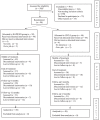Physical and mental health outcomes of an integrated cognitive behavioural and weight management therapy for people with an eating disorder characterized by binge eating and a high body mass index: a randomized controlled trial
- PMID: 35610603
- PMCID: PMC9131673
- DOI: 10.1186/s12888-022-04005-y
Physical and mental health outcomes of an integrated cognitive behavioural and weight management therapy for people with an eating disorder characterized by binge eating and a high body mass index: a randomized controlled trial
Abstract
Background: Bulimia nervosa (BN) and binge eating disorder (BED) are eating disorders (EDs) characterized by recurrent binge eating. They are associated with medical complications, impaired adaptive function and often a high BMI, for which a multidisciplinary treatment approach may be needed. This study explored the efficacy of a novel intervention integrating Cognitive Behavioural Therapy- Enhanced (CBT-E) and weight management for people with recurrent binge eating episodes and high BMI with respect to physical, psychopathological and quality of life outcomes.
Methods: Ninety-eight adults diagnosed with BN, BED, or Other Specified/Unspecified Feeding or Eating Disorder (OSFED/UFED) and BMI ≥ 27 to <40 kg/m2 were randomized to a multidisciplinary approach, the Healthy APproach to weIght management and Food in Eating Disorders (HAPIFED) or to CBT-E. Metabolic parameters, health-related quality of life, general psychological and ED symptoms and ED diagnostic status outcomes are reported. Data were analyzed with mixed effects models adopting multiple imputed datasets where data were missing.
Results: Both HAPIFED and CBT-E showed statistical significance for the time effect, with reduction in stress (p < 0.001), improvement in mental health-related quality of life (p = 0.032), reduction in binge eating severity (p < 0.001), and also in global ED symptoms scores (p < 0.001), with the significant changes found at end of treatment and sustained at 12-month follow-up. However, no statistical significance was found for differences between the interventions in any of the outcomes measured. Despite a high BMI, most participants (> 75%) had blood test results for glucose, insulin, triglycerides and cholesterol within the normal range, and 52% were within the normal range for the physical component of quality of life at baseline with no change during the trial period.
Conclusion: Integrating weight and ED management resulted in comparable outcomes to ED therapy alone. Although adding weight management to an ED intervention had no adverse effects on psychological outcomes, it also had no beneficial effect on metabolic outcomes. Therefore, more intense weight management strategies may be required where indicated to improve metabolic outcomes. Safety will need to be concurrently investigated.
Trial registration: US National Institutes of Health clinical trial registration number NCT02464345 , date of registration 08/06/2015. Changes to the present paper from the published protocol paper (Trials 18:578, 2015) and as reported in the Trial registration (clinicaltrials.gov) are reported in Supplementary File 1.
Keywords: Binge-eating disorder; Bulimia nervosa; Quality of life; Therapy; Weight loss.
© 2022. The Author(s).
Conflict of interest statement
PH receives/has received sessional fees and lecture fees from the Australian Medical Council, Therapeutic Guidelines publication, and New South Wales Institute of Psychiatry; royalties/honoraria from Hogrefe and Huber, McGraw Hill Education, Blackwell Scientific Publications, Biomed Central and PlosMedicine; and has received research grants from the NHMRC and ARC. She is Chair of the National Eating Disorders Collaboration Steering Committee in Australia (2019–) and a Member of the ICD-11 Working Group for Eating Disorders (2012–2018) and was Chair of the Clinical Practice Guidelines Project Working Group (Eating Disorders) of RANZCP (2012–2015). She is a consultant for Takeda pharmaceuticals. MAP participated in a 2016 meeting of an advisory board for the treatment of binge eating disorder at Shire Pharmaceuticals, Brazil. AC is a member of the World Health Organization Working Group on Feeding and Eating Disorders for the Revision of ICD-10 Mental and Behavioural Disorders. AS is the author of The Don’t Go Hungry Diet (Bantam, Australia and New Zealand, 2007) and Don’t Go Hungry for Life (Bantam, Australia and New Zealand, 2011). She has also received payment from Eli Lilly, the Pharmacy Guild of Australia, Novo Nordisk, the Dietitians Association of Australia, Shoalhaven Family Medical Centres, the Pharmaceutical Society of Australia, and Metagenics for presentation at conferences, and served on the Nestlé Health Science Optifast® VLCDTM Advisory Board from 2016 to 2018. ST receives royalties from Hogrefe and Huber, Routledge and McGraw-Hill Publishers. He has also been the recipient of honoraria and travel and research grants from Shire Pharmaceuticals. He has chaired their Australian Binge-Eating Disorder Advisory Board and has been the author of commissioned reports. All views expressed in these reports have been his own. He is a mental health advisor to the Australian Commonwealth Department of Veterans Affairs and a consultant to Weight Watchers (WW). JCA receives/has received research grants, consultancy fees, and advisory board fees from Takeda Pharmaceuticals. He receives/has received royalties/honoraria from Artmed Panamericana Editora. He also received research grant from the Brazilian National Research Council (CNPq). The remaining authors report no competing interests.
Figures

References
-
- American Psychiatric Association . Diagnostic and statistical manual of mental disorders. 5. Arlington: American Psychiatric Publishing; 2013.
Publication types
MeSH terms
Associated data
LinkOut - more resources
Full Text Sources
Medical

